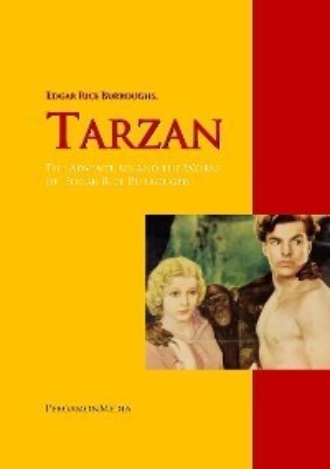
Полная версия
Tarzan: The Adventures and the Works of Edgar Rice Burroughs
"Come here," he said to the lad. "I will show you how to secure the ape should he show signs of rebellion during the trip."
The lad laughed. "It will not be necessary," he replied. "Ajax will do whatever I tell him to do."
The old man stamped his foot angrily. "Come here, as I tell you," he repeated. "If you do not do as I say you shall not accompany the ape to Dover—I will take no chances upon his escaping."
Still smiling, the lad crossed the room and stood before the Russ.
"Turn around, with your back toward me," directed the latter, "that I may show you how to bind him quickly."
The boy did as he was bid, placing his hands behind him when Paulvitch told him to do so. Instantly the old man slipped the running noose over one of the lad's wrists, took a couple of half hitches about his other wrist, and knotted the cord.
The moment that the boy was secured the attitude of the man changed. With an angry oath he wheeled his prisoner about, tripped him and hurled him violently to the floor, leaping upon his breast as he fell. From the bed the ape growled and struggled with his bonds. The boy did not cry out—a trait inherited from his savage sire whom long years in the jungle following the death of his foster mother, Kala the great ape, had taught that there was none to come to the succor of the fallen.
Paulvitch's fingers sought the lad's throat. He grinned down horribly into the face of his victim.
"Your father ruined me," he mumbled. "This will pay him. He will think that the ape did it. I will tell him that the ape did it. That I left him alone for a few minutes, and that you sneaked in and the ape killed you. I will throw your body upon the bed after I have choked the life from you, and when I bring your father he will see the ape squatting over it," and the twisted fiend cackled in gloating laughter. His fingers closed upon the boy's throat.
Behind them the growling of the maddened beast reverberated against the walls of the little room. The boy paled, but no other sign of fear or panic showed upon his countenance. He was the son of Tarzan. The fingers tightened their grip upon his throat. It was with difficulty that he breathed, gaspingly. The ape lunged against the stout cord that held him. Turning, he wrapped the cord about his hands, as a man might have done, and surged heavily backward. The great muscles stood out beneath his shaggy hide. There was a rending as of splintered wood—the cord held, but a portion of the footboard of the bed came away.
At the sound Paulvitch looked up. His hideous face went white with terror—the ape was free.
With a single bound the creature was upon him. The man shrieked. The brute wrenched him from the body of the boy. Great fingers sunk into the man's flesh. Yellow fangs gaped close to his throat—he struggled, futilely—and when they closed, the soul of Alexis Paulvitch passed into the keeping of the demons who had long been awaiting it.
The boy struggled to his feet, assisted by Akut. For two hours under the instructions of the former the ape worked upon the knots that secured his friend's wrists. Finally they gave up their secret, and the boy was free. Then he opened one of his bags and drew forth some garments. His plans had been well made. He did not consult the beast, which did all that he directed. Together they slunk from the house, but no casual observer might have noted that one of them was an ape.
Chapter 4
The killing of the friendless old Russian, Michael Sabrov, by his great trained ape, was a matter for newspaper comment for a few days. Lord Greystoke read of it, and while taking special precautions not to permit his name to become connected with the affair, kept himself well posted as to the police search for the anthropoid.
As was true of the general public, his chief interest in the matter centered about the mysterious disappearance of the slayer. Or at least this was true until he learned, several days subsequent to the tragedy, that his son Jack had not reported at the public school en route for which they had seen him safely ensconced in a railway carriage. Even then the father did not connect the disappearance of his son with the mystery surrounding the whereabouts of the ape. Nor was it until a month later that careful investigation revealed the fact that the boy had left the train before it pulled out of the station at London, and the cab driver had been found who had driven him to the address of the old Russian, that Tarzan of the Apes realized that Akut had in some way been connected with the disappearance of the boy.
Beyond the moment that the cab driver had deposited his fare beside the curb in front of the house in which the Russian had been quartered there was no clue. No one had seen either the boy or the ape from that instant—at least no one who still lived. The proprietor of the house identified the picture of the lad as that of one who had been a frequent visitor in the room of the old man. Aside from this he knew nothing. And there, at the door of a grimy, old building in the slums of London, the searchers came to a blank wall—baffled.
The day following the death of Alexis Paulvitch a youth accompanying his invalid grandmother, boarded a steamer at Dover. The old lady was heavily veiled, and so weakened by age and sickness that she had to be wheeled aboard the vessel in an invalid chair.
The boy would permit none but himself to wheel her, and with his own hands assisted her from the chair to the interior of their stateroom—and that was the last that was seen of the old lady by the ship's company until the pair disembarked. The boy even insisted upon doing the work of their cabin steward, since, as he explained, his grandmother was suffering from a nervous disposition that made the presence of strangers extremely distasteful to her.
Outside the cabin—and none there was aboard who knew what he did in the cabin—the lad was just as any other healthy, normal English boy might have been. He mingled with his fellow passengers, became a prime favorite with the officers, and struck up numerous friendships among the common sailors. He was generous and unaffected, yet carried an air of dignity and strength of character that inspired his many new friends with admiration as well as affection for him.
Among the passengers there was an American named Condon, a noted blackleg and crook who was "wanted" in a half dozen of the larger cities of the United States. He had paid little attention to the boy until on one occasion he had seen him accidentally display a roll of bank notes. From then on Condon cultivated the youthful Briton. He learned, easily, that the boy was traveling alone with his invalid grandmother, and that their destination was a small port on the west coast of Africa, a little below the equator; that their name was Billings, and that they had no friends in the little settlement for which they were bound. Upon the point of their purpose in visiting the place Condon found the boy reticent, and so he did not push the matter—he had learned all that he cared to know as it was.
Several times Condon attempted to draw the lad into a card game; but his victim was not interested, and the black looks of several of the other men passengers decided the American to find other means of transferring the boy's bank roll to his own pocket.
At last came the day that the steamer dropped anchor in the lee of a wooded promontory where a score or more of sheet-iron shacks making an unsightly blot upon the fair face of nature proclaimed the fact that civilization had set its heel. Straggling upon the outskirts were the thatched huts of natives, picturesque in their primeval savagery, harmonizing with the background of tropical jungle and accentuating the squalid hideousness of the white man's pioneer architecture.
The boy, leaning over the rail, was looking far beyond the man-made town deep into the God-made jungle. A little shiver of anticipation tingled his spine, and then, quite without volition, he found himself gazing into the loving eyes of his mother and the strong face of the father which mirrored, beneath its masculine strength, a love no less than the mother's eyes proclaimed. He felt himself weakening in his resolve. Nearby one of the ship's officers was shouting orders to a flotilla of native boats that was approaching to lighter the consignment of the steamer's cargo destined for this tiny post.
"When does the next steamer for England touch here?" the boy asked.
"The Emanuel ought to be along most any time now," replied the officer. "I figgered we'd find her here," and he went on with his bellowing remarks to the dusty horde drawing close to the steamer's side.
The task of lowering the boy's grandmother over the side to a waiting canoe was rather difficult. The lad insisted on being always at her side, and when at last she was safely ensconced in the bottom of the craft that was to bear them shoreward her grandson dropped catlike after her. So interested was he in seeing her comfortably disposed that he failed to notice the little package that had worked from his pocket as he assisted in lowering the sling that contained the old woman over the steamer's side, nor did he notice it even as it slipped out entirely and dropped into the sea.
Scarcely had the boat containing the boy and the old woman started for the shore than Condon hailed a canoe upon the other side of the ship, and after bargaining with its owner finally lowered his baggage and himself aboard. Once ashore he kept out of sight of the two-story atrocity that bore the legend "Hotel" to lure unsuspecting wayfarers to its multitudinous discomforts. It was quite dark before he ventured to enter and arrange for accommodations.
In a back room upon the second floor the lad was explaining, not without considerable difficulty, to his grandmother that he had decided to return to England upon the next steamer. He was endeavoring to make it plain to the old lady that she might remain in Africa if she wished but that for his part his conscience demanded that he return to his father and mother, who doubtless were even now suffering untold sorrow because of his absence; from which it may be assumed that his parents had not been acquainted with the plans that he and the old lady had made for their adventure into African wilds.
Having come to a decision the lad felt a sense of relief from the worry that had haunted him for many sleepless nights. When he closed his eyes in sleep it was to dream of a happy reunion with those at home. And as he dreamed, Fate, cruel and inexorable, crept stealthily upon him through the dark corridor of the squalid building in which he slept—Fate in the form of the American crook, Condon.
Cautiously the man approached the door of the lad's room. There he crouched listening until assured by the regular breathing of those within that both slept. Quietly he inserted a slim, skeleton key in the lock of the door. With deft fingers, long accustomed to the silent manipulation of the bars and bolts that guarded other men's property, Condon turned the key and the knob simultaneously. Gentle pressure upon the door swung it slowly inward upon its hinges. The man entered the room, closing the door behind him. The moon was temporarily overcast by heavy clouds. The interior of the apartment was shrouded in gloom. Condon groped his way toward the bed. In the far corner of the room something moved—moved with a silent stealthiness which transcended even the trained silence of the burglar. Condon heard nothing. His attention was riveted upon the bed in which he thought to find a young boy and his helpless, invalid grandmother.
The American sought only the bank roll. If he could possess himself of this without detection, well and good; but were he to meet resistance he was prepared for that too. The lad's clothes lay across a chair beside the bed. The American's fingers felt swiftly through them—the pockets contained no roll of crisp, new notes. Doubtless they were beneath the pillows of the bed. He stepped closer toward the sleeper; his hand was already half way beneath the pillow when the thick cloud that had obscured the moon rolled aside and the room was flooded with light. At the same instant the boy opened his eyes and looked straight into those of Condon. The man was suddenly conscious that the boy was alone in the bed. Then he clutched for his victim's throat. As the lad rose to meet him Condon heard a low growl at his back, then he felt his wrists seized by the boy, and realized that beneath those tapering, white fingers played muscles of steel.
He felt other hands at his throat, rough hairy hands that reached over his shoulders from behind. He cast a terrified glance backward, and the hairs of his head stiffened at the sight his eyes revealed, for grasping him from the rear was a huge, man-like ape. The bared fighting fangs of the anthropoid were close to his throat. The lad pinioned his wrists. Neither uttered a sound. Where was the grandmother? Condon's eyes swept the room in a single all-inclusive glance. His eyes bulged in horror at the realization of the truth which that glance revealed. In the power of what creatures of hideous mystery had he placed himself! Frantically he fought to beat off the lad that he might turn upon the fearsome thing at his back. Freeing one hand he struck a savage blow at the lad's face. His act seemed to unloose a thousand devils in the hairy creature clinging to his throat. Condon heard a low and savage snarl. It was the last thing that the American ever heard in this life. Then he was dragged backward upon the floor, a heavy body fell upon him, powerful teeth fastened themselves in his jugular, his head whirled in the sudden blackness which rims eternity—a moment later the ape rose from his prostrate form; but Condon did not know—he was quite dead.
The lad, horrified, sprang from the bed to lean over the body of the man. He knew that Akut had killed in his defense, as he had killed Michael Sabrov; but here, in savage Africa, far from home and friends what would they do to him and his faithful ape? The lad knew that the penalty of murder was death. He even knew that an accomplice might suffer the death penalty with the principal. Who was there who would plead for them? All would be against them. It was little more than a half-civilized community, and the chances were that they would drag Akut and him forth in the morning and hang them both to the nearest tree—he had read of such things being done in America, and Africa was worse even and wilder than the great West of his mother's native land. Yes, they would both be hanged in the morning!
Was there no escape? He thought in silence for a few moments, and then, with an exclamation of relief, he struck his palms together and turned toward his clothing upon the chair. Money would do anything! Money would save him and Akut! He felt for the bank roll in the pocket in which he had been accustomed to carry it. It was not there! Slowly at first and at last frantically he searched through the remaining pockets of his clothing. Then he dropped upon his hands and knees and examined the floor. Lighting the lamp he moved the bed to one side and, inch by inch, he felt over the entire floor. Beside the body of Condon he hesitated, but at last he nerved himself to touch it. Rolling it over he sought beneath it for the money. Nor was it there. He guessed that Condon had entered their room to rob; but he did not believe that the man had had time to possess himself of the money; however, as it was nowhere else, it must be upon the body of the dead man. Again and again he went over the room, only to return each time to the corpse; but no where could he find the money.
He was half-frantic with despair. What were they to do? In the morning they would be discovered and killed. For all his inherited size and strength he was, after all, only a little boy—a frightened, homesick little boy—reasoning faultily from the meager experience of childhood. He could think of but a single glaring fact—they had killed a fellow man, and they were among savage strangers, thirsting for the blood of the first victim whom fate cast into their clutches. This much he had gleaned from penny-dreadfuls.
And they must have money!
Again he approached the corpse. This time resolutely. The ape squatted in a corner watching his young companion. The youth commenced to remove the American's clothing piece by piece, and, piece by piece, he examined each garment minutely. Even to the shoes he searched with painstaking care, and when the last article had been removed and scrutinized he dropped back upon the bed with dilated eyes that saw nothing in the present—only a grim tableau of the future in which two forms swung silently from the limb of a great tree.
How long he sat thus he did not know; but finally he was aroused by a noise coming from the floor below. Springing quickly to his feet he blew out the lamp, and crossing the floor silently locked the door. Then he turned toward the ape, his mind made up.
Last evening he had been determined to start for home at the first opportunity, to beg the forgiveness of his parents for this mad adventure. Now he knew that he might never return to them. The blood of a fellow man was upon his hands—in his morbid reflections he had long since ceased to attribute the death of Condon to the ape. The hysteria of panic had fastened the guilt upon himself. With money he might have bought justice; but penniless!—ah, what hope could there be for strangers without money here?
But what had become of the money? He tried to recall when last he had seen it. He could not, nor, could he, would he have been able to account for its disappearance, for he had been entirely unconscious of the falling of the little package from his pocket into the sea as he clambered over the ship's side into the waiting canoe that bore him to shore.
Now he turned toward Akut. "Come!" he said, in the language of the great apes.
Forgetful of the fact that he wore only a thin pajama suit he led the way to the open window. Thrusting his head out he listened attentively. A single tree grew a few feet from the window. Nimbly the lad sprang to its bole, clinging cat-like for an instant before he clambered quietly to the ground below. Close behind him came the great ape. Two hundred yards away a spur of the jungle ran close to the straggling town. Toward this the lad led the way. None saw them, and a moment later the jungle swallowed them, and John Clayton, future Lord Greystoke, passed from the eyes and the knowledge of men.
It was late the following morning that a native houseman knocked upon the door of the room that had been assigned to Mrs. Billings and her grandson. Receiving no response he inserted his pass key in the lock, only to discover that another key was already there, but from the inside. He reported the fact to Herr Skopf, the proprietor, who at once made his way to the second floor where he, too, pounded vigorously upon the door. Receiving no reply he bent to the key hole in an attempt to look through into the room beyond. In so doing, being portly, he lost his balance, which necessitated putting a palm to the floor to maintain his equilibrium. As he did so he felt something soft and thick and wet beneath his fingers. He raised his open palm before his eyes in the dim light of the corridor and peered at it. Then he gave a little shudder, for even in the semi-darkness he saw a dark red stain upon his hand. Leaping to his feet he hurled his shoulder against the door. Herr Skopf is a heavy man—or at least he was then—I have not seen him for several years. The frail door collapsed beneath his weight, and Herr Skopf stumbled precipitately into the room beyond.
Before him lay the greatest mystery of his life. Upon the floor at his feet was the dead body of a strange man. The neck was broken and the jugular severed as by the fangs of a wild beast. The body was entirely naked, the clothing being strewn about the corpse. The old lady and her grandson were gone. The window was open. They must have disappeared through the window for the door had been locked from the inside.
But how could the boy have carried his invalid grandmother from a second story window to the ground? It was preposterous. Again Herr Skopf searched the small room. He noticed that the bed was pulled well away from the wall—why? He looked beneath it again for the third or fourth time. The two were gone, and yet his judgment told him that the old lady could not have gone without porters to carry her down as they had carried her up the previous day.
Further search deepened the mystery. All the clothing of the two was still in the room—if they had gone then they must have gone naked or in their night clothes. Herr Skopf shook his head; then he scratched it. He was baffled. He had never heard of Sherlock Holmes or he would have lost no time in invoking the aid of that celebrated sleuth, for here was a real mystery: An old woman—an invalid who had to be carried from the ship to her room in the hotel—and a handsome lad, her grandson, had entered a room on the second floor of his hostelry the day before. They had had their evening meal served in their room—that was the last that had been seen of them. At nine the following morning the corpse of a strange man had been the sole occupant of that room. No boat had left the harbor in the meantime—there was not a railroad within hundreds of miles—there was no other white settlement that the two could reach under several days of arduous marching accompanied by a well-equipped safari. They had simply vanished into thin air, for the native he had sent to inspect the ground beneath the open window had just returned to report that there was no sign of a footstep there, and what sort of creatures were they who could have dropped that distance to the soft turf without leaving spoor? Herr Skopf shuddered. Yes, it was a great mystery—there was something uncanny about the whole thing—he hated to think about it, and he dreaded the coming of night.
It was a great mystery to Herr Skopf—and, doubtless, still is.
Chapter 5
Captain Armand Jacot of the Foreign Legion sat upon an outspread saddle blanket at the foot of a stunted palm tree. His broad shoulders and his close-cropped head rested in luxurious ease against the rough bole of the palm. His long legs were stretched straight before him overlapping the meager blanket, his spurs buried in the sandy soil of the little desert oasis. The captain was taking his ease after a long day of weary riding across the shifting sands of the desert.
Lazily he puffed upon his cigarette and watched his orderly who was preparing his evening meal. Captain Armand Jacot was well satisfied with himself and the world. A little to his right rose the noisy activity of his troop of sun-tanned veterans, released for the time from the irksome trammels of discipline, relaxing tired muscles, laughing, joking, and smoking as they, too, prepared to eat after a twelve-hour fast. Among them, silent and taciturn, squatted five white-robed Arabs, securely bound and under heavy guard.
It was the sight of these that filled Captain Armand Jacot with the pleasurable satisfaction of a duty well-performed. For a long, hot, gaunt month he and his little troop had scoured the places of the desert waste in search of a band of marauders to the sin-stained account of which were charged innumerable thefts of camels, horses, and goats, as well as murders enough to have sent the whole unsavory gang to the guillotine several times over.
A week before, he had come upon them. In the ensuing battle he had lost two of his own men, but the punishment inflicted upon the marauders had been severe almost to extinction. A half dozen, perhaps, had escaped; but the balance, with the exception of the five prisoners, had expiated their crimes before the nickel jacketed bullets of the legionaries. And, best of all, the ring leader, Achmet ben Houdin, was among the prisoners.
From the prisoners Captain Jacot permitted his mind to traverse the remaining miles of sand to the little garrison post where, upon the morrow, he should find awaiting him with eager welcome his wife and little daughter. His eyes softened to the memory of them, as they always did. Even now he could see the beauty of the mother reflected in the childish lines of little Jeanne's face, and both those faces would be smiling up into his as he swung from his tired mount late the following afternoon. Already he could feel a soft cheek pressed close to each of his—velvet against leather.






